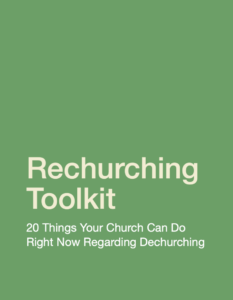I was skeptical of The Chosen when I first started hearing buzz about it. The artistic track record for biblical movies and TV is notoriously bad, after all. And yet to my surprise and delight, the show—the first-ever multi-season series about the life of Christ—is actually good. Quite good.
Directed by Dallas Jenkins (read Justin Taylor’s 2018 interview with him), The Chosen was financed, distributed, and produced (shot in Texas) outside the Hollywood system. Raising more than $10 million in “equity crowdfunding” from more than 16,000 initial investors, the series became the top crowdfunded TV or film project in history. The eight-episode first season debuted online in 2019 via VidAngel, and this spring all episodes were released for free on YouTube as part of a brilliantly timed global livestream event during the COVID-19 quarantine. Watch the series for free on The Chosen app, available wherever you get your mobile apps.
The show’s grassroots funding model and low-budget constraints, however, do not result in the low quality we’ve (sadly) come to expect from evangelical entertainment. On the contrary, the show’s inability to “go big” with flashy set pieces and special effects means the scale is necessarily more intimate and restrained, with the focus squarely on good characters and good storytelling. The series is winning over audiences around the world. It has a 9.8 / 10 average rating on IMDB and a 99 percent average audience score on RottenTomatoes.
What works so well about the series? How does The Chosen avoid so many of the pitfalls that make similar efforts in the genre so cringeworthy? Here are four reasons the series is a breath of fresh air for audiences looking for better-quality Bible narratives on screen.
Compelling Characters
For me, the most disappointing thing about many Bible films and series is that the characters are sadly unlikable: one-dimensional, underdeveloped, boring, lacking complexity. But The Chosen is different. Here the characters are more than just pawns in service of the plot. They are people with complex backgrounds, quirks, faults, and—imagine this—humanity. (Refreshingly, the actors also look the part of Mediterranean ethnicity and attempt to speak with appropriate accents.) Though there are some exceptions (I find the villainous Quintus a bit cartoonish), most of the The Chosen’s characters are interesting and relatable. It’s compelling to watch their lives transform as the season progresses, from Simon Peter (Shahar Isaac) and the other disciples to Nicodemus (Erick Avari) and especially Mary Magdalene (Elizabeth Tabish), who moved me to tears in the second episode when she recounted her conversion to a skeptical Nicodemus: “Here’s what I can tell you. I was one way, and now I am completely different. And the thing that happened in between . . . was him.”
Real Emotion
Part of why The Chosen’s characters are compelling is that they embody real emotion; they aren’t flannel-graph cutouts made to regurgitate Scripture verse by verse. They are humans with specificity. In the show, Simon Peter is a bit of a knucklehead. Matthew (Paras Patel) is on the autism spectrum. Andrew (Noah James) is a bad dancer. Jesus (Jonathan Roumie) has a good sense of humor. The laughs and cries of these characters are believable. With help from a team of expert consultants (including New Testament scholar Doug Huffman), the show is faithful to Scripture and careful to avoid theological or historical error. But sometimes biblical screen adaptations are so concerned with pleasing everyone that they come across as lifeless. The Chosen understands that filling in these characters requires some speculation about the type of people they were, sketching out the details of their lives in a way that’s consistent with but goes beyond what’s said of them in Scripture. This is always the most controversial-but-necessary part of any movie/TV version of the Bible—especially as it relates to Jesus—but The Chosen does an admirable job walking the line between accuracy and watchability.
The Chosen’s inability to ‘go big’ with flashy set pieces and special effects means the scale is necessarily more intimate and restrained, with the focus squarely on good characters and good storytelling.
Focus on Individual Encounters with Christ
The Chosen moved me on numerous occasions, because it put me in the shoes of characters who encounter Christ and must come to a decision point about the meaning of their lives vis-a-vis his. “I am rejected by others,” the weary Samaritan woman tells Jesus at the well. “I know,” Jesus responds, “but not by the Messiah.” To see her countenance transform from despair to hope is beautiful. Likewise, it’s compelling to watch the posture and vocation of Simon Peter transform when he responds to Christ’s “Follow me” call. It’s agonizing to watch Nicodemus wrestle with the cost of discipleship, as he (like Matthew the tax collector) ponders leaving his position of status and comfort to follow this controversial rebel rabbi. It’s moving to witness Jesus comfort Simon’s wife, Eden (Lara Silva), who knows her life will be more difficult because of her husband’s new “fisher of men” vocation: “I see you,” Jesus says to her, but also to everyone watching the show.
Effective Style
Often biblical movies/TV shows suffer because they have either no discernible aesthetic or one that is oddly old-fashioned or too rigid/formal. The Chosen’s style is not groundbreaking, but it is contemporary and effective. Here are just a few examples of what the show does well aesthetically:
- Flashbacks. Whether in brief forays into the Old Testament to show the continuity of Christ’s life and teaching with the Hebrew Scriptures, or in depicting the backstories of various characters, The Chosen effectively deploys flashbacks.
- Handheld Camerawork. Taking a page from Friday Night Lights (among many other shows), the looser, on-the-ground feel of the camera fosters a sense of intimacy and realism in the drama on screen.
- Silence. It’s crazy how often Christian filmmakers fail to take advantage of quietness and scenes without words, ignoring the basic advice to “show, don’t tell.” Thankfully, The Chosen doesn’t fall into this trap and uses imagery and action (without a narrator!) to tell the story without over-reliance on words.
- Narrative Breathing Room. Jenkins wants The Chosen to be eight (!) seasons long, with season seven entirely devoted to the crucifixion and season eight devoted to what happens afterward. This approach allows for narrative breathing room, which always makes for better drama. Instead of forcing years of narrative into a two-hour span, The Chosen can devote an entire episode to one or two short scenes from the Bible.
- Episodic Structure. The show’s episodic structure allows it to dive deeper into themes and motifs that might be missed in a more compressed narrative, like an entire episode devoted to the Wedding at Cana (episode six) or one that beautifully depicts Jesus’s dynamic with children (episode three).
Hope for Future Seasons
The Chosen is not perfect, and there’s plenty one could quibble with. But I’m optimistic, based on the promise of season one, that the series will only get better from here.
In these times of global anxiety and mounting despair, the hope Jesus offers is greatly needed. If The Chosen helps remind us of that hope, or introduces it to some audiences for the first time, then that alone is reason for us to cheer its success and share it with others.
20 Things You Can Do Right Now to Prevent Dechurching
 We’re currently experiencing the largest and fastest religious shift in the history of the United States. But there are practical things we can do inside our local churches.
We’re currently experiencing the largest and fastest religious shift in the history of the United States. But there are practical things we can do inside our local churches.
Jim Davis and Michael Graham have commissioned the largest and most comprehensive study of dechurching in America. Informed by their findings, they’ve written a book and developed this corresponding toolkit with resources to help you address the dechurching phenomenon.
We’re delighted to offer you the ‘Rechurching Toolkit’ for FREE today. Click on the link below to get instant access to this resource—worth $100—and be equipped to understand and address the issues behind dechurching.


































